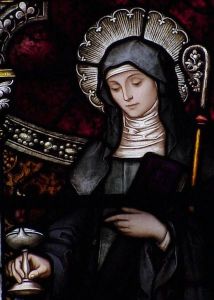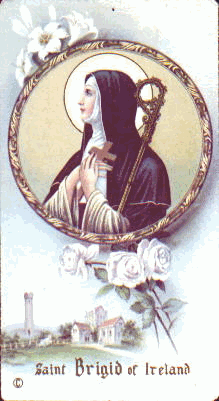Brigid, Bride, Bridget, and Brigit are only a few of the names
this Goddess is known by. Pronounced as “Breet”, worshiped by the
Irish as one of their many Celtic Goddesses. Thusly, in order to
bring their precious Goddess into Christianity, she was brought to life
as being the daughter of Dublach, a Pagan Scottish King of Leinster and
of Brocca, a Christian slave woman, whom Saint Patrick baptized.
Brigid was born in 453 and died on February 1st, 523. Hence
the reference to Imbolc. Brigid grew up with high spirits, a
loving heart and listening to many of Saint Patrick’s preachings.
These preachings influenced her greatly in many of her future
endeavors.
Brigid always had a tender heart for people in need. She
would often give many of her father’s things to those in need, much to
his dislike. Brigid’s father arranged a marriage for her, but
Brigid refused and took her vows. It is said that she prayed to
loose her beauty so that no others would ask her hand in
marriage. Her prayers were granted and after she took her vows,
her beauty was restored. When Saint Patrick heard her vows, he
stated that she would be destined for great things.
Brigid’s first convent started with seven nuns. She started
convents all over Ireland, with the convent at Kildara having nineteen.
Which lead to many travels and patronage from travelers, sailors,
blacksmiths, bards, and healers. Babies, farmers, midwives, Ireland,
and children of unmarried parents are also among her patronage.
Brigid has
many attributes:
Fire
The Oak Tree
Three
concentric circles
The serpent
around her head - Fertility to divert evil
The sun for
feminine power.
The number
nine
The cow
The ewe
A lighted
candle
A bright
arrow
Water
The death of Brigid on February 1st, also is the setting for
Imbolc also known as St. Brigid’s day for Christians. The Pagan
celebration to symbolize better times coming. She is
Imbolc. The symbols of milk and corn cakes are both in dedication
to Brigid. Purity, growth, re-newal and dispensing of the old and
making way for the new are all aspects of this day.
Whether Saint Brigid or the Celtic Goddess of ancient times,
Brigid has survived the ever changes of religion. She is able to
find her way into our lives because she is an inspirational figure and
so many people are devoted to her that they will not let her be lost.
Ritual for Imbolc
By AmberRain
Supplies:
White altar
cloth
White
candles –7 (One for the ritual bath)
Goddess
Candle
White
flowers
Jasmine
incense
Usual alter
supplies
Bath salts
Lavender oil
Chamomile
oil
Milk &
Honey
Corn cakes
First step
is to take a ritual bath. Light a white candle, and use the bath
salts, lavender and chamomile oils
with your bath. Relax and cleanse yourself. Take time
to focus on yourself, prepare my mind for re-newal.
Second step
is to cleanse my working area. Then I ground myself by Listening to
music and meditate.
When I am ready, I begin.
Cast the
circle and call the elements. Light the incense and call upon the
Goddess Brigid to join the circle
and light her candle and say:
Blessed be
this season of Imbolc
Mother
Earth stirs from Her long sleep.
Everything
is waiting for spring.
This is the
season of purification, a renewing of life.
At this
time and in this place between the worlds,
I come to
the Lady that I may gain counsel.
Now I
meditate while asking the Goddess for inspiration and guidance for the
future... When I feel ready,
I repeat…
I know my
path is within your keeping.
Guide me in
the year to come
Light
all the Candles and say…
As there is
a renewal within the plants and animals,
so shall
there be renewal in my life.
Kneel
before the altar,
Sit and
reflect on the meaning of this day.
When
ready, raise the glass of milk
Say…
Great
Goddess give my life good health, happiness, prosperity
And magical
power.
I honor you.
Merry meet
and merry part and merry meet again
So Mote It
Be!!!!
Drink and
eat remembering to put some outside for the little people. Meditate to
ground again. When I am finished, I release my circle. I then take the
drink and cake outside, and say, “ enjoy, be blessed, and grow strong,
so mote it be.
Sources:
Conway,
D.J., “Celtic Magic”, page 106, 1990.
Monaghan,
Patricia, “The Goddess Path”, page 170-176, 1999.
Http://www.catholic-forum.com,
Brigid of Ireland
Http://www.irelandseye.com,
Saint Brigid
http://www.wic.org/artwork/brigid.htm,
History of Women through Art
Copyright
This page is the intellectual and
creative
property of Amber Rain.


